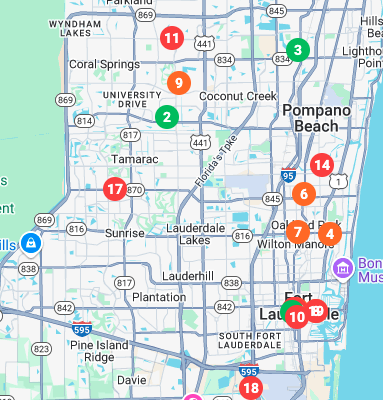Call Us Now: 754-227-1888
Local Rank Tracker
Here's how to use the Local Rank Tracker Tool:
Maps Rankings
- Enter your business name in the first field (e.g., "Collman Digital Marketing")
- Enter your target keyword and location in the second field (e.g., "SEO Sunrise")
- The tool will automatically search within the specified area
- Results show your business's rank among local competitors on Google Maps
- Color-coded markers indicate rankings:
- Green: Ranks 1-3
- Orange: Ranks 4-9
- Red: Ranks 10+
SERP Rankings
- The tool automatically checks your Google Search rankings
- View results across three pages:
- Page 1 (Green): Positions 1-10
- Page 2 (Orange): Positions 11-20
- Page 3 (Red): Positions 21+
- Click the legend buttons to switch between pages
- Each result shows:
- Website favicon
- Title
- Snippet
- Type (Local or Organic)
The tool provides a comprehensive view of both your local Maps presence and organic search rankings in the local area.
Local Rank Tracker
Tracking your local SEO performance is like keeping an eye on your garden. You want to know which areas are flourishing and which need more care. Welcome to the world of local rank tracking—your blueprint for staying ahead in the local SEO game. Let’s dive into how you can boost your business’s online presence using these tools.
Introduction to Local Rank Tracking
Ever wondered why some local businesses always seem to pop up first on Google Maps or in search results? It’s not luck. It’s the power of local SEO, and tracking your rank is crucial for success. Without a tracker, you’re essentially navigating blindfolded.
Why Local SEO Matters
Why should you care about local SEO? Because it directly influences foot traffic and sales. Even if you’re running a small bakery or a digital agency, people are searching for services near them every day. If your business isn’t visible, you’re missing out.
The Rise of Local Search
Local search has exploded in recent years. “Near me” queries are skyrocketing, as more people want quick answers about local products and services. Mobile devices have revolutionized how we search, emphasizing the need for local SEO.
Impact on Small Businesses
Small businesses have everything to gain from local search. The playing field is level, meaning you can compete with bigger brands if you play your cards right. But staying competitive requires constant monitoring of your local rankings.
What Is a Local Rank Tracker?
A local rank tracker is your digital assistant for keeping tabs on your website’s performance in specific areas. It tells you where you stand, what’s working, and what isn’t. This tool provides data on keyword rankings, competitor performance, and more.
Key Features of a Good Rank Tracker
A robust rank tracker should offer location-based results, daily updates, competitor analysis, and customizable reports. The more features, the better you can strategize.
Why You Need One for Your Business
If you want to optimize your marketing budget, improve visibility, and understand how your competitors are performing, you need a local rank tracker. It’s an essential tool for informed decision-making.
How Local Rank Trackers Work
They operate by scraping search engine results to see where your business ranks for specific keywords and locations. Then, they compile this data into digestible reports. Think of it as having a bird’s-eye view of your SEO landscape.
Data Collection Methods
Rank trackers use APIs or web scraping to gather data. They simulate real user behavior, pulling location-specific results. The more accurate the data, the better your insights.
Analyzing Results for Actionable Insights
Once you have the data, what’s next? Use it to identify gaps and opportunities. If your rankings are slipping, it’s time to tweak your strategy, whether it’s optimizing your Google Business Profile or improving your content.

Benefits of Using a Local Rank Tracker
The advantages are numerous. First, you get improved visibility. Second, you can keep a close eye on your competitors. Third, you get a performance report card, helping you tweak strategies for better results.
Improved Visibility
By knowing which keywords are working and which aren’t, you can optimize your website and business listings. This leads to better exposure and more potential customers.
Competitor Analysis
A good rank tracker lets you spy on competitors. Find out where they’re ranking and what keywords they’re targeting. Then, use this intel to improve your own SEO game.
Performance Monitoring
Track your SEO performance over time. See what’s causing spikes or dips in your rankings and make informed adjustments. This keeps your SEO strategy agile and effective.
Setting Up Your Local Rank Tracker
Ready to set up your tracker? First, choose the right tool for your needs. Make sure it’s easy to use, reliable, and fits your budget.
Choosing the Right Tool
There are tons of options out there, but not all are created equal. Consider factors like data accuracy, customer support, and user interface.
Key Considerations
Look for features like mobile rank tracking, customizable dashboards, and white-label reporting if you serve clients. Each detail matters.
Configuring Your Settings
Set up your account, add keywords, and specify locations. This ensures you’re getting data that matters to you and your business.
Adding Keywords and Locations
Don’t just track any keywords. Focus on those that are relevant to your business. Choose specific areas where you want to monitor performance.
Best Practices for Local Rank Tracking
Keep your data up-to-date. SEO isn’t a one-and-done task; it requires regular monitoring and adjustments. Track changes and stay adaptable.
Regular Updates and Reporting
Schedule regular updates and generate reports to share with your team. This keeps everyone in the loop and ensures a coordinated effort.
Adapting to Algorithm Changes
Search engines change algorithms frequently. A good local rank tracker keeps you updated, helping you adjust your strategy as needed.
Common Mistakes to Avoid
Even seasoned pros make mistakes. Let’s look at the most common errors and how to sidestep them.
Neglecting Mobile Search Results
Mobile and desktop rankings can differ significantly. Ignoring mobile data is a huge mistake in a world where most searches happen on smartphones.
Tracking Irrelevant Keywords
Focus on keywords that bring value. Tracking generic or unrelated keywords will skew your data and waste your resources.
Top Local Rank Tracker Tools
Here are some of the best tools you can use today:
Google Business Profile Insights
It’s free and gives you a ton of data on how people interact with your business listing. However, it lacks the depth of some paid tools.
SEMrush Local SEO Toolkit
A powerhouse for comprehensive local SEO tracking, offering data on rankings, backlinks, and even reviews.
BrightLocal
Known for its user-friendly interface and reliable data. It’s perfect for small to medium-sized businesses looking to improve local SEO.
Conclusion
Local rank tracking isn’t just an optional part of your SEO strategy; it’s a necessity. By using the right tools and following best practices, you’ll have a clear roadmap to improve visibility and beat out the competition. Ready to get started? The results might just surprise you!
FAQs
1. How often should I check my local rankings? It’s ideal to monitor rankings weekly, but some businesses prefer daily updates to stay on top of trends
2. Can local rank trackers work for multiple locations? Yes, most tools allow you to monitor multiple locations, which is essential for businesses with several branches.
3. What’s the best free local rank tracker? Google Business Profile Insights is a great starting point, though paid tools often provide more detailed insights.
4. Why do my rankings differ on mobile vs. desktop? Search engines serve results based on user behavior, and mobile rankings often differ due to local proximity factors.
5. How can I improve my local rankings quickly? Optimize your Google Business Profile, get more local backlinks, and ensure your NAP (Name, Address, Phone) details are consistent across directories.
